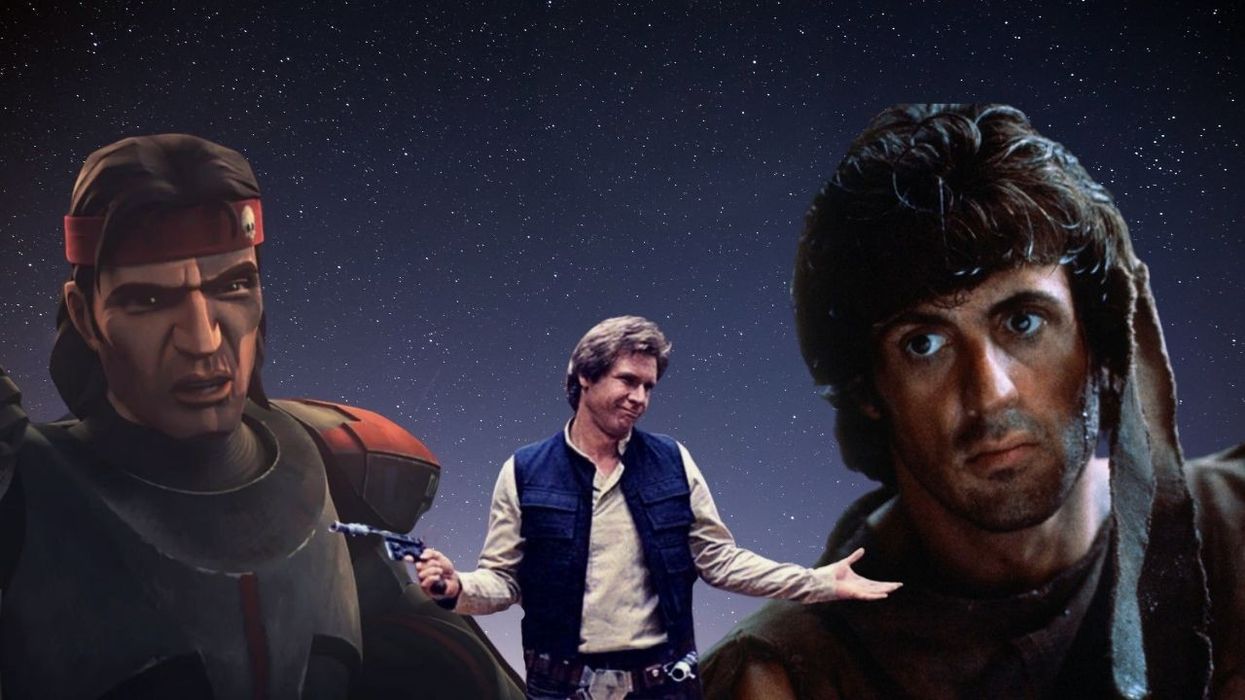The Secret Sauce of 'Star Wars' Is That It's Good to Be Bad
With the premiere of The Bad Batch, executive producer Dave Filoni keeps doing Star Wars justice.

On the surface, Star Wars was always a story of simple black and white, light and dark. Even in its color scheme. Luke wears white. Vader wears black. George Lucas himself famously said, "Bad guys get red lightsabers, and good guys get blue ones." Keep it simple. Joseph Campbell. You know the drill.
But the real secret sauce is the choices despite all that.
What makes Star Wars great is that there is moral ambiguity nestled in amongst those polarities. This is embodied by various characters over time, but initially just by one.
Han Solo was the key to Star Wars (1977). Not just because Harrison Ford played the part. Separating Ford's stardom from the role of Han is virtually impossible, but the two things fed into each other and created a new superstar and another iconic rendition of a familiar archetype to rival those played by Bogart and Gable, or written by everyone from Lord Byron to Raymond Chandler.
In a universe of goods and bads that are as plain as day, Han served as a perfect antidote to such false simplicity. He wanted to be neither. He wasn't sure where he'd land. He finally made up his mind. (Well, for now.)
The story arc of the first Star Wars film is Han's arc. Luke is the protagonist, but it would be like everything else if it all didn't hinge on what Han would choose. Good or evil?
What makes Star Wars different than The Lord of the Rings? Han, of course. The sprinkling of uncertainty.
The same later goes for Luke and Vader in subsequent episodes of the series. Darth Vader becomes a fascinating figure when internal conflict is introduced to him. He becomes an even more dynamic character than Han who, by the end of the trilogy, is pretty much all good.
Every time there is new Star Wars content created it seems this all-important piece is missing. They even brought Han Solo back in sequels, but didn't let him serve his true purpose. It would be like having a Bond movie where Bond has sworn off drinking, fast cars, women, and being a spy. What's even the point of it being Bond?
There is one portion of the Star Wars creative world that does consistently find and utilize morally uncertain characters. That's Dave Filoni and the team he worked with on The Clone Wars, Rebels, and now The Bad Batch.
These animated series end up being more complex than any modern live-action entry, save maybe Rogue One, which also pulled off the Han Solo secret sauce to perfection.
Filoni learned alongside Lucas and has often shared the lessons he took from that. Making sure the universe is presenting good and evil for children young and old is critical, but if there is no choice between good and evil... what is the point?
Bringing some questions of moral standing is important for characters in children's stories. It's what drives the lesson or parable. Filoni's Clone Wars series covered a period of time where one villain pitted two forces against one another in a drawn-out armed conflict where there were few true heroes and true villains. The focus shifted towards those caught in the middle.
The Bad Batch goes even a step further. A team of special clone troops is left uncertain of their role in a changing political landscape. Bred for a war that has ended, working perhaps for the bad guys, unsure if they should be following orders.... even the lead character looks a lot like Rambo... and not just to evoke the spirit of the pure action of First Blood 2: Rambo, but clearly to evoke the moral complexity of First Blood.
How far will The Bad Batch take these ideas? Ultimately we know it will only ever get so dark, since these are meant to be uplifting stories for children of all ages (even 40-year-old ones). But the point remains that Filoni and co. "get it," and that's why these series continue to work better than some of the bigger live-action entries in the very same franchise.
What are your thoughts? Leave them in the comments.











